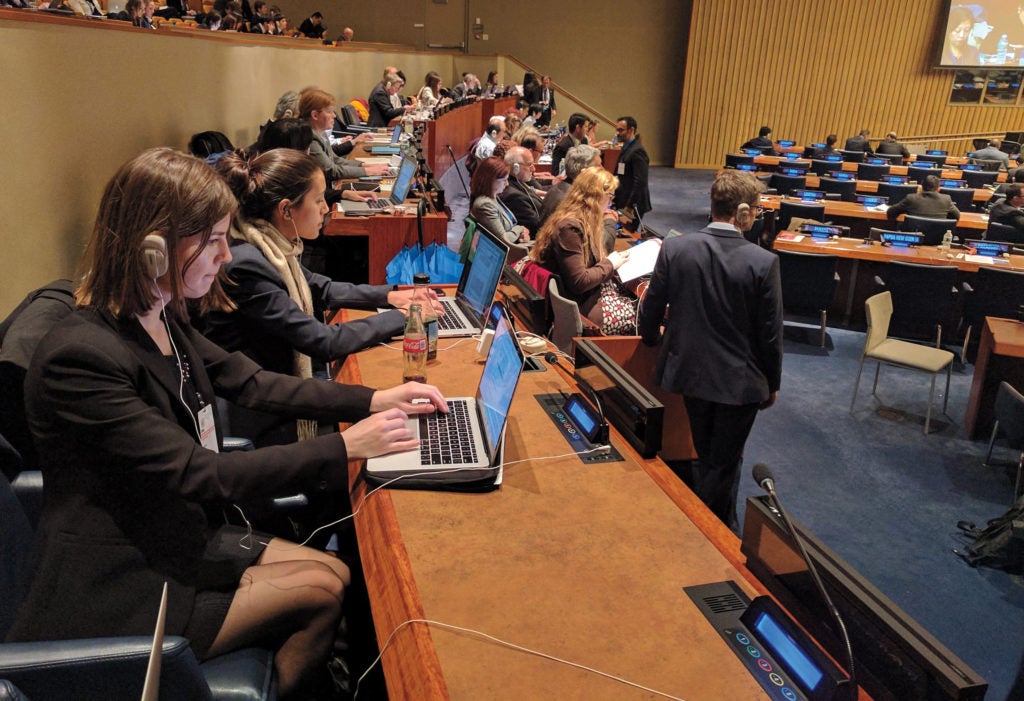| In May 2018, a federal magistrate issued a temporary injunction to prevent the U.S. Department of Education from forcing former students of for-profit Corinthian Colleges to repay what the plaintiffs describe as fraudulent student debt. | The PREDATORY LENDING AND CONSUMER PROTECTION CLINIC at the HLS WilmerHale Legal Services Center is representing the plaintiffs in Calvillo Manriquez v. DeVos, a class-action suit filed in December 2017. A hearing on whether the plaintiffs should receive complete loan cancellation is expected this summer. |
| In May 2018, the U.S. House of Representatives rejected the Agriculture and Nutrition Act of 2018, a farm bill that would have cut the Supplemental Nutrition Assistance Program (formerly “food stamps”), dismantled core conservation programs, and ended many supports for local and organic foods. | Under the leadership of the HLS FOOD LAW AND POLICY CLINIC, the Farm Bill Law Enterprise met with 77 congressional offices in early May 2018 to share research findings on the bill’s threats to food security, rural communities and the environment. Created by the Food Law and Policy Clinic, the Farm Bill Law Enterprise is a first-of-its-kind collaboration among eight food, environment, and public health law programs, with clinical students providing recommendations and analysis. |
| In September 2017, in Beacon Residential Management, LP v. R.P., a case with important implications for victims of domestic and sexual violence, the Massachusetts Supreme Judicial Court ruled that a mother may intervene on behalf of herself and her children in an eviction action brought by a landlord against her husband, despite the mother’s not being a named tenant on the lease,if she lived with her family in the apartment and alleges domestic violence in the home. | Three students at the Housing Justice for Survivors Project, under the supervision of the project’s founding attorney, Julia Devanthéry, filed an amicus brief in the case. The project, at the WilmerHale Legal Services Center’s HOUSING LAW CLINIC, represents tenants facing housing instability as a result of domestic or sexual violence. |
| In July 2017, 122 nations adopted the groundbreaking Treaty on the Prohibition of Nuclear Weapons, the first global treaty banning these weapons. In October 2017, the International Campaign to Abolish Nuclear Weapons (ICAN) was awarded the Nobel Peace Prize for changing the course of nuclear disarmament by shifting focus from national security to the catastrophic humanitarian and environmental consequences of these weapons. | Under the leadership of Associate Director of Armed Conflict and Civilian Protection Bonnie Docherty ’01, the HLS INTERNATIONAL HUMAN RIGHTS CLINIC collaborated with ICAN and other partners to achieve the ban on nuclear weapons, with Docherty (who recently launched a related HLS initiative) and clinical students providing legal advice to ICAN during the negotiations. |
| In July 2017, the Massachusetts Supreme Judicial Court ruled, in Lunn v. Commonwealth, that state law enforcement officers do not have the authority to arrest and detain an individual pursuant to a request from federal immigration authorities. It was the first ruling by a state’s high court on this question. | The Harvard Immigration and Refugee Clinical Program’s CRIMMIGRATION CLINIC filed an amicus brief in Lunn that discussed the lack of legislative authorization for state or local law enforcement agents to detain someone solely pursuant to a federal immigration detainer. Five HLS students, working with Crimmigration Clinic Supervisor Phil Torrey, helped write the brief. |
| In May 2017, the Massachusetts Supreme Judicial Court extended the federal Americans with Disabilities Act to apply to disabled prisoners seeking parole. | The HARVARD PRISON LEGAL ASSISTANCE PROJECT filed the appeal in Crowell v. Massachusetts Parole Board, and PLAP student attorney Tabitha Cohen ’18 argued the case. |
| In 2017, numerous congressional proposals to repeal the Affordable Care Act were defeated. Each proposal threatened the health insurance of over 20 million people, with a disproportionate impact on low-income and vulnerable Americans. The chronic illness and disability communities are often cited as playing an outsized role in the successful defeat of these ACA repeal efforts. | The HLS Center for Health Law and Policy Innovation’s HEALTH LAW AND POLICY CLINIC played a leading role in mobilizing the chronic illness and disability communities’ advocacy in opposition to the repeal of the ACA. The clinic chairs both the national Chronic Illness and Disability Partnership and the Federal AIDS Policy Partnership, two coalitions representing medical providers, public health professionals, advocates, and people living with chronic health conditions and disabilities. The coalitions were a go-to source for policy analysis, action alerts and advocacy that helped stop the repeal of the ACA. |
| A female veteran of the U.S. Marine Corps sought disability benefits from the Department of Veterans Affairs for the ongoing mental health consequences of an in-service sexual assault by a fellow Marine. The VA denied her claim three times on the basis that the sexual assault never occurred. After extensive litigation, the claim was eventually approved in 2017, charting new pathways at the agency and in court for survivors of military sexual trauma to establish the fact of a sexual assault and to obtain justice. | The VETERANS LAW AND DISABILITY BENEFITS CLINIC at theWilmerHale Legal Services Center represented the veteran during three years of litigation that involved two separate appeals to federal court. Because of the tenacity and creativity of six clinical students working under the supervision of Faculty Director Daniel Nagin and Associate Clinic Director Betsy Gwin over multiple semesters, the client received over $50,000 in back benefits plus ongoing benefits that lift her out of poverty. |
Teaching & Learning

Alice Osman LL.M. ’17, (left) and Carina Bentata Gryting ’18 participating in the negotiations of the Treaty on the Prohibition of Nuclear Weapons at the U.N.
Experiential and Impactful
A sampling of recent wins for HLS clinics and SPOs